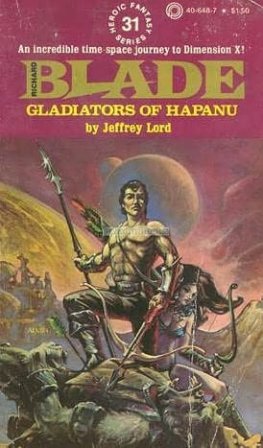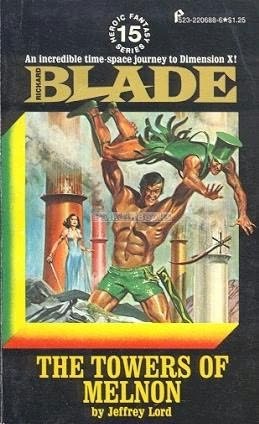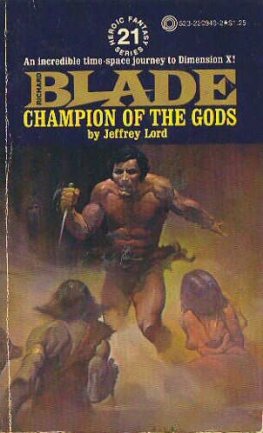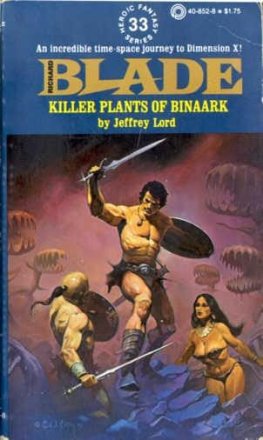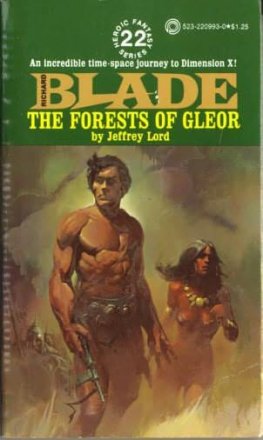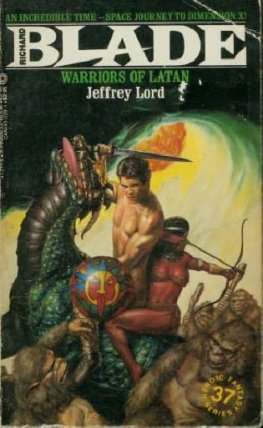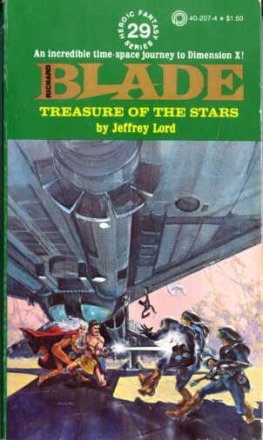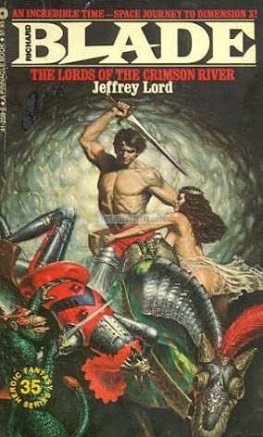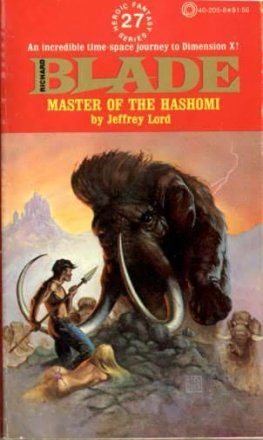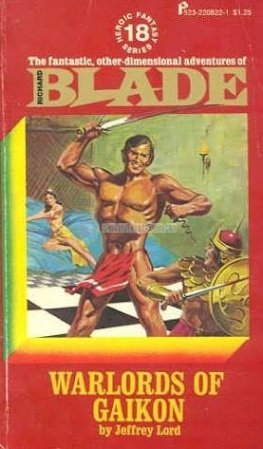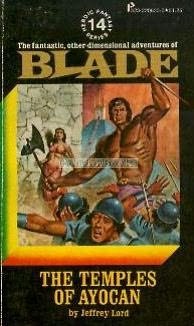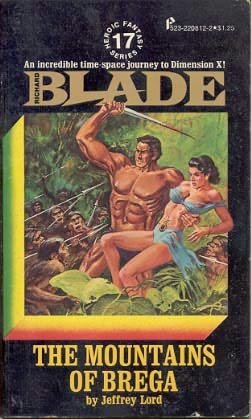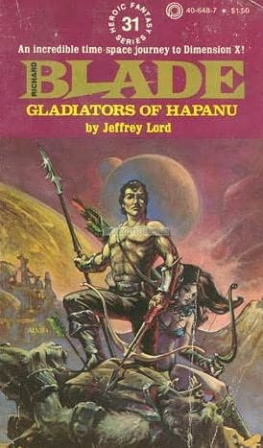Dzheffri Lord - Gladiators Of Hapanu
Here you can read online Dzheffri Lord - Gladiators Of Hapanu full text of the book (entire story) in english for free. Download pdf and epub, get meaning, cover and reviews about this ebook. year: 1979, publisher: Pinnacle Books, genre: Science fiction. Description of the work, (preface) as well as reviews are available. Best literature library LitArk.com created for fans of good reading and offers a wide selection of genres:
Romance novel
Science fiction
Adventure
Detective
Science
History
Home and family
Prose
Art
Politics
Computer
Non-fiction
Religion
Business
Children
Humor
Choose a favorite category and find really read worthwhile books. Enjoy immersion in the world of imagination, feel the emotions of the characters or learn something new for yourself, make an fascinating discovery.
- Book:Gladiators Of Hapanu
- Author:
- Publisher:Pinnacle Books
- Genre:
- Year:1979
- ISBN:0523406487
- Rating:4 / 5
- Favourites:Add to favourites
- Your mark:
- 80
- 1
- 2
- 3
- 4
- 5
Gladiators Of Hapanu: summary, description and annotation
We offer to read an annotation, description, summary or preface (depends on what the author of the book "Gladiators Of Hapanu" wrote himself). If you haven't found the necessary information about the book — write in the comments, we will try to find it.
Gladiators Of Hapanu — read online for free the complete book (whole text) full work
Below is the text of the book, divided by pages. System saving the place of the last page read, allows you to conveniently read the book "Gladiators Of Hapanu" online for free, without having to search again every time where you left off. Put a bookmark, and you can go to the page where you finished reading at any time.
Font size:
Interval:
Bookmark:
Gladiators of Hapanu
Blade 31
By Jeffrey Lord
Chapter 1
Richard Blade walked alone down the underground corridor two hundred feet below the Tower of London. As he walked he tried to see the corridor as would a man who'd never seen it before and knew nothing about it.
The floor was large, close-set tile, a bland, neutral brown alternating with an equally bland gray in a sort of checkerboard pattern. The tile threw up echoes from Blade's footsteps for the walls and ceiling to catch and bounce back. The floor showed signs of wear from many fast-moving feet, but it was spotlessly clean. In fact it was not merely clean, it was as antiseptic as the floor of a hospital.
So were the walls. They were not tiled, but something solid covered with pale green semi-gloss paint, easy on the eyes and easy to wash. At intervals the walls were broken by plain metal doors. All of them opened by push buttons rather than knobs, and all of them had spy eyes in the middle, so that the people inside could see anyone waiting outside. The impression the doors gave was less a hospital than a top-secret military installation. These were doors which might hide the latest guided missile or experiments with a new and deadly nerve gas.
In other places the walls were broken by metal panels with EMERGENCY stencilled on them in foot high red letters. There were no conventional fire alarms or fire extinguishers in sight, and it was impossible to guess what might lurk behind the panels.
Overhead was a ceiling of pale white acoustic tile, broken every few feet by more metal panels, ventilating grilles, squares of translucent glass or plastic, and sometimes grids of small holes that might have been made by termites. At intervals a faded discolored line ran across the floor, up one wall, across the ceiling, and down the wall again. Something once stood across the corridor in these places. Now it was gone and the corridor stretched unbroken from end to end, more than two hundred feet.
Even without the steady echoes of Blade's footsteps, the corridor wasn't entirely quiet. There was the distant hum of air-conditioners, the click of typewriters, muffled hints of human voices, and other sounds that might have been anything. The corridor itself was echoing, empty, and sterile, but there was life and activity on either side of it.
So much for seeing the corridor through a stranger's eyes. Blade turned off his imagination and walked faster. He enjoyed these mental exercises, and was good at them. When he'd been at Oxford a teacher said he would make at least a respectable novelist, though probably not a great one.
Blade hadn't become a novelist, but when he'd left Oxford he'd entered a profession where a good imagination was almost as important. He became a field agent for the secret intelligence agency MI6A. In fact, he was hand-picked by its chief, the graying man known only as J. J saw a particularly promising young man, and he was right. Blade became one of the agency's best men, carrying out missions few others could have handled and surviving dangers that would have killed practically anyone else.
One reason for his success and survival was that imagination of his. More easily than most, he could put himself into the mind of an enemy, thinking of what the man might do, sometimes before the enemy thought of it himself: This kind of imagination didn't win him any prizes, but it saved his life a good many times.
Then a brilliant, eccentric scientist named Lord Leighton conceived the idea of linking a powerful human mind with an even more powerful computer. He wasn't exactly sure what this would produce, but he hoped it would be something more powerful and complete than either the computer or the man.
He chose Richard Blade for the experiment, because he needed a powerful mind in a superbly fit body and Blade had both. The computer went to work on Blade's mind-and suddenly Blade was whirled off across nowhere into an unknown world they called Dimension X.
The same gifts that kept him alive as a secret agent now kept him alive to return to England. They went on to keep him alive many more times, for Dimension X was obviously a major scientific breakthrough. A breakthrough into what, even Lord Leighton wasn't quite sure, but certainly a breakthrough. Out there in the unknown lay human resources of raw material, knowledge, and living space. All of it might be put to use for Britain, all of it might become the foundation for a new British Empire.
So the exploration of Dimension X became a Project, with the support of the Prime Minister's office, a budget of millions of pounds, a staff of dozens of the most brilliant minds in twenty different fields. None of these hired geniuses knew what the Project was all about, because the Dimension X secret was the most closely-guarded in Britain's history. No one cared to guess what might happen if the secret got out, but so far they hadn't had to find out the hard way. J became chief of security for the Project, and so far he'd done his job there extremely well. Dimension X was still a secret.
All of this, however, rested on the shoulders of one man Richard Blade. He was the only living human being who could make the round trip into Dimension X and come out alive and sane. They'd found this out the hard way, at the cost of a number of people dead or mad.
In spite of this, the search for a new Dimension X traveler still went on. Blade's shoulders were broad, but they could bear only so much of a burden for so long. Even more important than Blade's body was his mind. That was strained to the limit every time he was hurled off into Dimension X, and sometimes matters didn't stop there.
Blade remembered the time he'd encountered the Wizard of Rentoro, an Italian Renaissance nobleman who'd passed into Dimension X by pure mental powers. The Wizard was a master of telepathy, telekinesis, and teleportation, perhaps the most dangerous opponent Blade's mind or body ever had.
At least he had been the most dangerous, until Blade's most recent trip into Dimension X. Lord Leighton was introducing not only a new, incredibly more powerful computer, but also new techniques for sending Blade into the unknown. With the new KALI computer and a completely automatic main sequence, it might finally be possible to send Blade to the same Dimension time after time. That would have been as important a breakthrough as finding another Dimension X traveler, although not quite as big a help to Blade.
As a matter of fact, the new technique did send Blade into the same Dimension twice in succession, as reliably as the London Underground. So the theory behind KALI was sound enough. Lord Leighton's theories usually were. In practice, it was very nearly a case of The operation was successful but the patient died.
Out in the unknown Blade met the Ngaa, the collective minds of an incredibly ancient race trapped on a doomed and dying world, once immensely wise but now grown evil with desperation. The Ngaa returned to England with Blade, driving him insane in the process-and that was only the beginning of the trail of destruction it left. By the time the whole nightmare was over, more than thirty people were dead. The Project was thrown into chaos and came within a few hours of being shut down for good by order of the Prime Minister.
In the end it was Blade himself who saved things. His mind restored, he pursued the Ngaa to its home, fought it, and destroyed it. Now Lord Leighton was free to continue the Project on a slightly less ambitious basis, and Blade was fit and ready for another trip.
Fit and ready, but with more scars than usual, including one that wasn't on his body and might be a long time healing. One of the victims of the Ngaa was Zoe Cornwall, kidnapped by the Ngaa and then murdered by it. Once Blade loved her and she loved him, in a past that now sometimes seemed as distant as the Middle Ages. They'd planned to marry, but the demands of Blade's work in the Project and the Official Secrets Act eventually drove them apart. Blade wasn't sure he'd ever stopped loving her. In any case, he hated to see innocent people of any sort dragged into the dangers he faced as a matter of professional duty.
Font size:
Interval:
Bookmark:
Similar books «Gladiators Of Hapanu»
Look at similar books to Gladiators Of Hapanu. We have selected literature similar in name and meaning in the hope of providing readers with more options to find new, interesting, not yet read works.
Discussion, reviews of the book Gladiators Of Hapanu and just readers' own opinions. Leave your comments, write what you think about the work, its meaning or the main characters. Specify what exactly you liked and what you didn't like, and why you think so.

